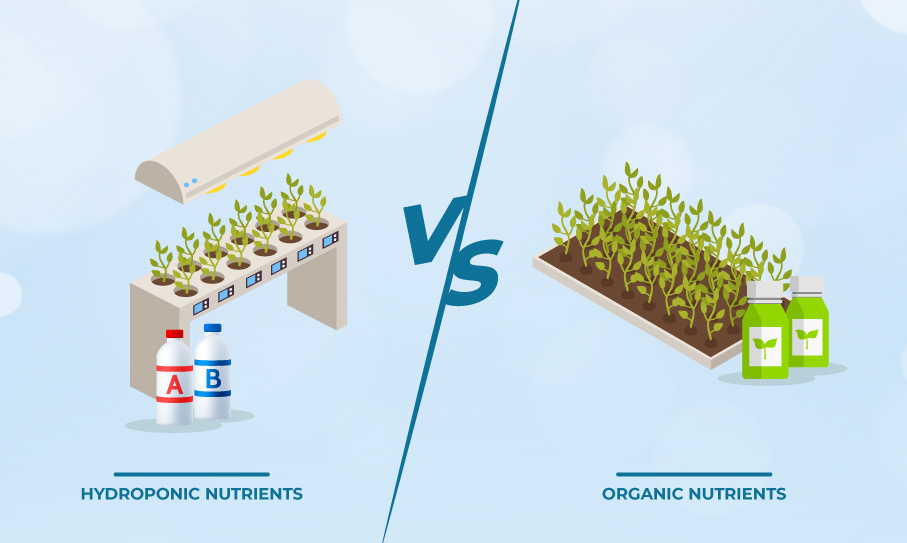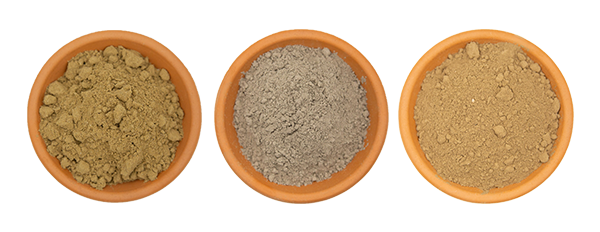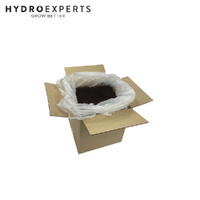Hydroponic vs Organic Nutrients: Key Differences
By Hydro Experts | 25 October 2022

If you're new to gardening, you might be wondering what the difference is between hydroponic and organic nutrients. To put it simply, hydroponic nutrients are created synthetically, while organic nutrients come from natural sources. Both types of nutrients can be used to fertilize plants, but they work in different ways.
Hydroponic nutrients are created in laboratories by combining various chemicals. They provide plants with a complete nutrient solution that contains all the essential elements that plants need to grow. These solutions are often used in commercial greenhouses and indoor gardens because they can be precisely tailored to the specific needs of the plants.
Organic nutrients, on the other hand, come from natural sources such as compost or manure. They provide plants with a more complete range of nutrients, including trace minerals and other beneficial compounds that can promote plant health.
Many gardeners prefer organic nutrients because they are more natural and eco-friendly. However, they can be more expensive than hydroponic nutrients and may not be as easily available.
Firstly, What are the most important nutrients for plants?
The three most important nutrients for plants are nitrogen, phosphorus, and potassium. These nutrients are often referred to as NPK for short.
- Nitrogen is responsible for the healthy growth of leaves and green parts of the plant.
- Phosphorus is essential for strong roots and flowers.
- Potassium helps to create a strong overall structure in plants and also aids in water retention
Why use hydroponic nutrients if I have an organic option?
- The main benefit is that plants grown in a hydroponic system tend to be healthier and more productive than those grown in soil. This is because hydroponic plants have direct access to all the nutrients they need, without having to compete with other plants for them. This results in bigger, healthier plants that produce more fruit or flowers.
- Additionally, since hydroponic systems do not use soil, they are much cleaner and easier to maintain than traditional gardens. This makes them ideal for people who want to grow their own food but don't have the time or space for a traditional garden.
- Hydroponic nutrients also allow you to dial in a specific dose of your desired minerals. this in turn gives you a granular level of control over the growth rate, size and overall health of your plants.
The Organic Nutrient Debate
- There is a lot of debate surrounding the use of organic nutrients for plants. Some people believe that organic nutrients are always better for plants, while others argue that they can actually be detrimental to plant health.
The truth is that there is no clear-cut answer.
- Organic nutrients can be beneficial for plants, but they can also be less effective than synthetic nutrients. It depends on the specific plant and the growing conditions. In general, organic nutrients are best used in conjunction with synthetic nutrients, rather than as a replacement for them it's worth noting here that organic nutrients are not always better for the environment either. The manufacturing process for synthetic nutrients has a smaller carbon footprint than the process of producing organic fertilizer. So if you're concerned about environmental sustainability, you may want to use synthetic nutrients instead of organic ones Ultimately, the decision of whether to use organic or synthetic nutrients is up to the gardener. There are pros and cons to both options, and it's important to weigh them carefully before making a decision.
Do plants and fruits grown in organic soil really taste better?
- There is no scientific evidence to support the claim that organic-grown plants taste better than those grown with synthetic nutrients. However, many gardeners believe that this is the case. Some argue that organic-grown plants are more flavorful because they have access to a wider variety of nutrients.
- Others believe that the lack of synthetic chemicals in organic nutrients results in a more natural flavour. Ultimately, it is up to each individual gardener to decide whether they think plants grown organic taste better.
What about yields? are yields bigger or smaller in organic farming?
- Some gardeners believe that organic-grown plants yield more, while others find that hydroponically-grown plants produce larger harvests. It is likely that the yields of both types of plants depend on a number of factors, such as the type of plant, genetics, the growing conditions, and the ultimate skill of the gardener.
Does Compost Tea contain Enough trace Nutrients for Hydroponics?
- Compost tea can provide some nutrients for hydroponics, but it is not a complete solution. Plants grown in hydroponics require a wide range of nutrients, and compost tea does not provide all of these. In general, it is best to use compost tea as a supplement to other nutrient sources, rather than relying on it completely
What are some examples of organic fertilisers?
Blood Meal
- A high-nitrogen organic fertilizer that is derived from animal blood. A blood meal is an excellent source of nitrogen for plants, but it can also be quite smelly.
Cottonseed Meal
- Cottonseed meal is a by-product of the cotton industry. It is relatively high in nitrogen and also contains some phosphorus and potassium
Compost
- Compost is a completely natural fertilizer that is made by breaking down organic matter, such as leaves and food scraps. Compost can be made at home or purchased from any garden centre
Fish Emulsion
- Fish emulsion is a liquid fertilizer that is made from fish parts and water. It is high in nitrogen and other nutrients, making it an excellent choice for plants
Chicken Manure
- Chicken manure is a popular organic fertilizer that is high in nitrogen and other nutrients. It can be purchased from bunnings or flower power or, you can source this locally from farmers
Bat guano
- An excellent organic fertilizer for hydroponics. It is high in nitrogen, phosphorus, and potassium, making it ideal for plants.
Worm Castings
- Worm castings are a by-product of vermicomposting. Vermicomposting is a process of composting using worms. Worms eat organic matter and excrete castings, which are excellent fertilisers for plants. Vermicompost can be also made at home or purchased from any garden centre and is rich in nutrients and beneficial microbes.
Seaweed Meal
- Seaweed meal is a type of organic fertilizer that is made from seaweed. It is high in potassium, nitrogen, and other nutrients, making it an excellent choice for plants.
Hydroponic Nutrients - what you need to know
What are some things to look for when choosing hydroponic nutrients?
- When choosing hydroponic nutrients, you'll want to look for a complete nutrient solution that contains all the essential elements that plants need to grow. You'll also want to make sure the solution is tailored to the specific needs of your plants
- Additionally, you'll want to choose a nutrient solution that is easy to use and easy to store. Some solutions come in powder form while others come in liquid form. Choose the form that best suits your needs. You also need to pay careful attention to manufacturer recommendations for nutrient dosing as a highly concentrated nutrient solution can cause nutrient burn and a host of other issues like nitrogen toxicity and calcium/magnesium deficiency
- Finally, you'll want to make sure the nutrient solution you choose is compatible with the hydroponic system you're using. Otherwise, you could end up damaging your plants or even your system.
How are synthetic hydroponic nutrients made?
- Synthetic hydroponic nutrients are made by combining different chemicals in a lab. These chemicals are then mixed together in the correct proportions to create a nutrient solution that is tailored for plants. This process allows gardeners to completely control the nutrient content of the solution, which leads to better results as you are adding nutrients in their trace state
Are the synthetic chemicals in hydroponic nutrients toxic to humans?
- No, the synthetic chemicals in hydroponic nutrients are not bad for humans. In fact, many of these chemicals are actually essential nutrients that plants need to grow. If you are concerned about the synthetic chemicals in hydroponic nutrients, you can always look for organic versions that are made with natural ingredients.
How much of hydroponic nutrients are just water?
- Most hydroponic nutrients are about 20-30% water. This helps to dilute the concentrated solution and make it easier for plants to absorb the nutrients
What is the difference between a hydroponic fertilizer and a hydroponic nutrient solution?
- Hydroponic fertilizer is a concentrated solution that contains all of the nutrients that plants need to grow. A hydroponic nutrient solution is a diluted version of this concentrate that is ready to use on plants. Most gardeners prefer to use nutrient solutions because they are easier to apply and less likely to cause problems if they are over-applied
Can excessive use of Hydroponic nutrients damage my plants?
- Yes, excessive use of hydroponic nutrients can damage your plants. This is because the roots of the plants can become burned if they are overloaded with nutrients. If you think that your plants are getting too many nutrients, you should flush the system with water to remove the excess from the roots.
Hydro Experts Hydroponic Nutrient Recommendations for Growing in COCO Coir
Hydro Experts Hydroponic Nutrient Recommendations for DWC
Hydro Experts Organic Fertiliser Recommendations for Soil
There is no clear scientific distinction between synthetic hydroponic nutrients and organics, it mostly boils down to personal choice & ethos and the skill and experience of the grower. Both sides of each camp swear by their own choice with the organic gurus swearing blind that flavour and yield are not only comparable to synthetic nutrients but can increase yields as well.
One notable point of the debate not mentioned earlier is that with synthetic nutrients you can correct problems or deficiencies very quickly with almost immediate results, when it comes to an organic workflow you may need to wait longer in order to correct deficiencies however, you are far less likely to burn (or even kill) you plants with organics as they are far more forgiving by nature.
Most of the issues concerned with organic gardening and plant issues are usually derived from overwatering rather than nutrient burn. Synthetic nutrients also have their place here as you can reduce your nutrient strength accordingly should your plants have less than a desirable response to fertiliser stress
Finally, you can also mix and match organics with Synthetics, especially when growing in coco coir but you may have to be more vigilant with DWC or flood and drain systems.
As always don't hesitate to read out to our staff for some expert advice!
Happy growing















